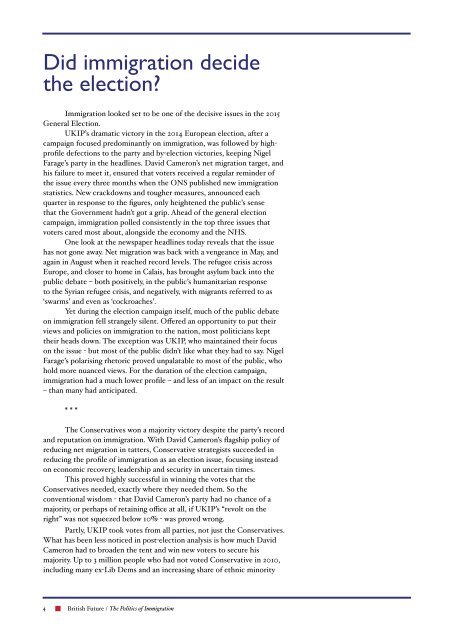THE POLITICS OF IMMIGRATION
The-politics-of-immigration
The-politics-of-immigration
Create successful ePaper yourself
Turn your PDF publications into a flip-book with our unique Google optimized e-Paper software.
Did immigration decide<br />
the election?<br />
Immigration looked set to be one of the decisive issues in the 2015<br />
General Election.<br />
UKIP’s dramatic victory in the 2014 European election, after a<br />
campaign focused predominantly on immigration, was followed by highprofile<br />
defections to the party and by-election victories, keeping Nigel<br />
Farage’s party in the headlines. David Cameron’s net migration target, and<br />
his failure to meet it, ensured that voters received a regular reminder of<br />
the issue every three months when the ONS published new immigration<br />
statistics. New crackdowns and tougher measures, announced each<br />
quarter in response to the figures, only heightened the public’s sense<br />
that the Government hadn’t got a grip. Ahead of the general election<br />
campaign, immigration polled consistently in the top three issues that<br />
voters cared most about, alongside the economy and the NHS.<br />
One look at the newspaper headlines today reveals that the issue<br />
has not gone away. Net migration was back with a vengeance in May, and<br />
again in August when it reached record levels. The refugee crisis across<br />
Europe, and closer to home in Calais, has brought asylum back into the<br />
public debate – both positively, in the public’s humanitarian response<br />
to the Syrian refugee crisis, and negatively, with migrants referred to as<br />
‘swarms’ and even as ‘cockroaches’.<br />
Yet during the election campaign itself, much of the public debate<br />
on immigration fell strangely silent. Offered an opportunity to put their<br />
views and policies on immigration to the nation, most politicians kept<br />
their heads down. The exception was UKIP, who maintained their focus<br />
on the issue - but most of the public didn’t like what they had to say. Nigel<br />
Farage’s polarising rhetoric proved unpalatable to most of the public, who<br />
hold more nuanced views. For the duration of the election campaign,<br />
immigration had a much lower profile – and less of an impact on the result<br />
– than many had anticipated.<br />
* * *<br />
The Conservatives won a majority victory despite the party’s record<br />
and reputation on immigration. With David Cameron’s flagship policy of<br />
reducing net migration in tatters, Conservative strategists succeeded in<br />
reducing the profile of immigration as an election issue, focusing instead<br />
on economic recovery, leadership and security in uncertain times.<br />
This proved highly successful in winning the votes that the<br />
Conservatives needed, exactly where they needed them. So the<br />
conventional wisdom - that David Cameron’s party had no chance of a<br />
majority, or perhaps of retaining office at all, if UKIP’s “revolt on the<br />
right” was not squeezed below 10% - was proved wrong.<br />
Partly, UKIP took votes from all parties, not just the Conservatives.<br />
What has been less noticed in post-election analysis is how much David<br />
Cameron had to broaden the tent and win new voters to secure his<br />
majority. Up to 3 million people who had not voted Conservative in 2010,<br />
including many ex-Lib Dems and an increasing share of ethnic minority<br />
4 British Future / The Politics of Immigration


